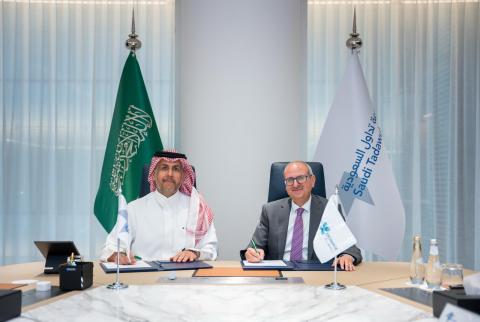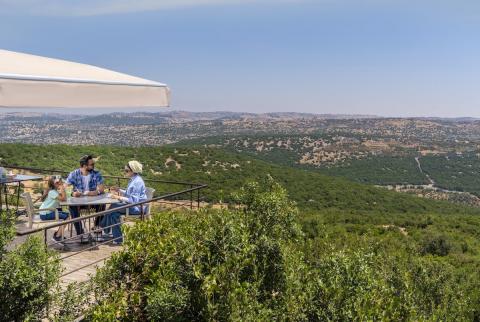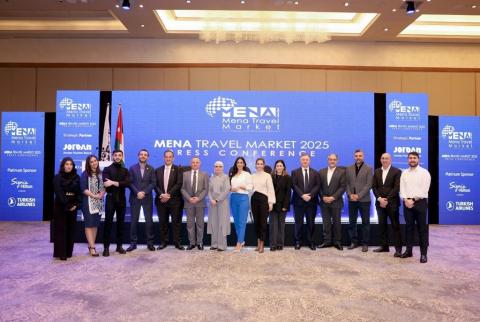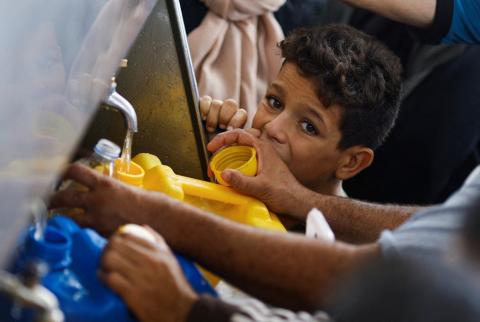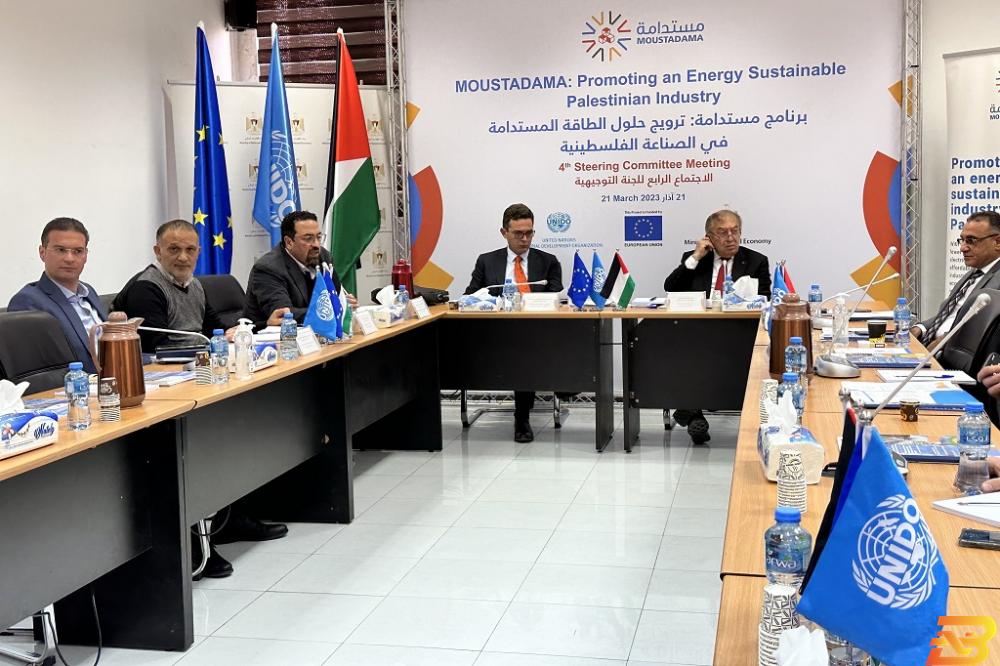
Ramallah-(BNEWS)- The MOUSTADAMA Programme organized its fourth meeting of the Steering Committee, which took place on Tuesday 21 March at the Ministry of the National Economy.
The meeting saw the participation of the highest level of the Programme governance chart, which includes Mr. Khaled Osaili, Minister of National Economy, Mr. Ayman Ismail, representative of the Palestinian Energy and National resources Authority (PENRA), Mr. Charles Raudot de Châtenay, Head of Economic Development of the European Union in Jerusalem, together with Mr. Tareq Emtairah and Mr. Ahmed ElFarra of the United Nations Industrial Development Organization (UNIDO).
Chaired by the Minister of National Economy, Mr. Khaled Osaili, the Steering Committee reviewed and discussed the results of the work carried out till March 2023, as well as the challenges, main achievements, and final activities to be carried out before the conclusion of the Programme.
The MOUSTADAMA Programme was launched by UNIDO at the end of 2019 to boost of the competitiveness of the Palestinian industrial sector through energy sustainable measures and innovations. MOUSTADAMA's design is based on a comprehensive approach based on four key pillars: creating an enabling policy environment, developing local capacity to implement RE/EE solutions, raising awareness to create demand for clean energy, and fostering an environment for innovation and entrepreneurship for long-term impact. Implemented by UNIDO, the Programme is funded by the European Union Representative Office in Jerusalem and implemented in partnership with the Ministry of National Economy (MoNE) and in cooperation with the Palestinian Energy and National Resources Authority (PENRA).
UNIDO Senior Programme Officer Ahmed El-Farra presented the latest results achieved during the last six months of the programme's implementation. He highlighted the progress made in improving policy regulation, in particular the net metering framework, which has been carried out under the supervision of the Technical Committee, now overseen by the newly established Green Industry Department (GID) at the Ministry of National Economy.
The positive results of the energy management system training, the renewable energy training and the financial analysis training were communicated to the Steering Committee members, who were also informed about the progress of the completed energy audits of the demonstration projects, supported by a solid data collection process. The latest achievements of the Cleantech component were also reviewed, including the innovative projects of the latest winning startups of the Palestine CleanTech Innovation Competition - 2nd Edition and the post-acceleration services put in place to provide ongoing support to all winners.
The results shared with the Steering Committee also included some concrete data on the Programme's impact on decarbonization, such as the 11,796 tons of CO2 reduced annually and the 7,911 MWh of energy saved annually.
Finally, Mr. ElFarra summarized the large network of partners supporting the consolidation of MOUSTADAMA's knowledge and results, as well as the upcoming activities planned to support the sustainability of this network.
The Steering Committee partners thanked UNIDO for its efforts and acknowledged the relevance of the presented results to push Palestinian industries into the trajectory of an effective decarbonization and an enhanced competitiveness. The Steering Committee validated a extension plan of MOUSTADAMA and reviewed the activities scheduled until the end of the Programme’s first cycle. Stakeholders were then encouraged by the main partners of UNIDO, the Ministry of National Economy and the European Union Representative Office in Jerusalem, to share priorities and preliminary approaches for further cooperation to consolidate the sustainability of the results and work together on the future scaling up of the Programme.
The Ministry of National Economy H.E. Mr. Khaled Osaili issued the following statement regarding the achievements and impact of the MOUSTADAMA Programme: “MOUSTADAMA has been instrumental in creating an environment conducive to the spread of sustainable energy. The Programme's integrated approach has succeeded in laying the foundations for the promotion of sustainable energy by creating an integrated architecture where supply and demand of clean energy solutions are supported and linked, where policies are updated to meet the needs of industry and the need to increasingly integrate renewables into energy production, and where entrepreneurial innovation is given new impetus and connection to markets”, said H.E. the Minister of National Economy Mr. Khaled Osaili. “I would also like to emphasize that the partnership with UNIDO has also been fruitful in terms of transferring operations and knowledge to the Ministry of National Economy, where the Green Industries Department has just officially become active. At the conclusion of MOUSTADAMA, the Department will take over the leadership of the Technical Committee and will continue to connect all the players in the clean and sustainable energy sector through the Peer-to-Peer platform developed by the Programme”, he continued.
Commenting on the results of the MOUSTADAMA Programme, Senior Programme Officer Mr. Ahmed ElFarra described the achievements as follows: "The MOUSTADAMA Programme is reaping the benefits of the activities conducted over the past few years. Real progress has been made in all the components of the Programme: hundreds of professionals have been trained in the energy field, dozens of companies have been helped to upgrade their infrastructural energy, and new cleantech entrepreneurs have been supported to start their businesses”, said Mr. Ahmed ElFarra, UNIDO Senior Programme Officer. “In addition to the figures that quantify our MOUSTADAMA Programme achievements, the synergies we have created with our partners are also part of our success story, such as the new Green Industries Department at the Ministry of National Economy, which will take the lead of the Technical Committee and continue to strengthen the energy policies and regulations, as well as all the partners who, from the representatives of the private sector to the innovation hubs, help to stimulate the technological and competitive upgrading of Palestinian industries”, he continues.


